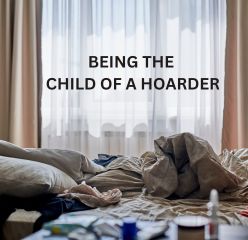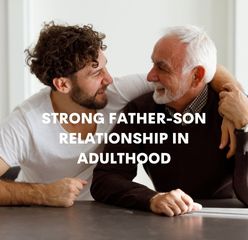Children of hoarders, once they realize that they are that, experience childhood in a completely unique way. They ask unique questions of the world. You carry a unique weight through your adult life unless you learn how to deal with the trauma of having hoarder parents.
In this article, we’ll delve into the lives of children of hoarders and what they grow up seeing. We’ll talk about stages of hoarding, what triggers hoarding and how to cope as the child of a hoarder.
What is the root cause of hoarding?
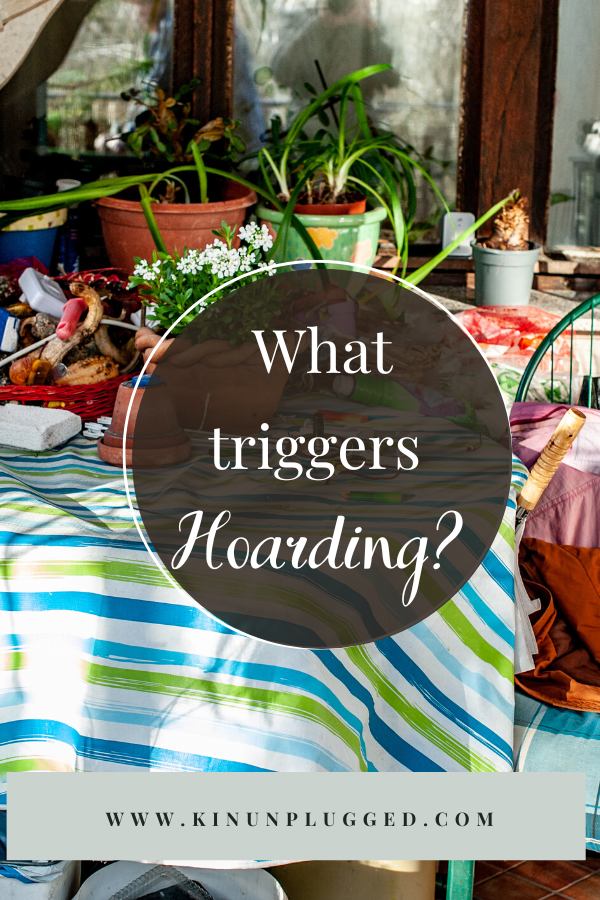
The root cause of hoarding is multifaceted and usually involves a mix of genetic, environmental and psychological factors. Research suggests that a family history of hoarding or mental health disorders like anxiety or depression can increase the likelihood of developing hoarding behaviors. Also, traumatic life events or significant stressors like losing a loved one or major life changes can contribute to the onset of hoarding.
When exploring what triggers hoarding, it is important to think about the individual’s emotional and cognitive processes. People who hoard may have difficulty making decisions, experience intense emotional attachments to possessions or be afraid of losing items they believe they might need in the future. These factors can create a cycle where the accumulation of items becomes a coping mechanism for underlying emotional distress or anxiety.
The 5 Stages of Hoarding
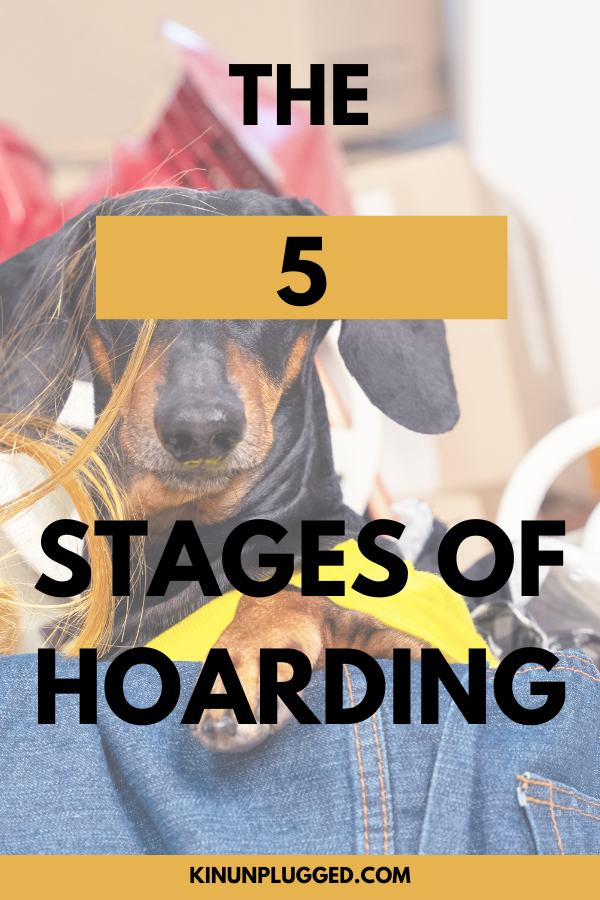
The five stages of hoarding provide insight into the progression of this disorder and its impact on individuals and their living spaces. These stages are:
- Clutter
This initial stage involves the gradual accumulation of possessions beyond what is considered normal or necessary. At this point, individuals may begin to experience difficulty discarding items and may show signs of attachment to objects.
- Difficulty organizing
As clutter continues to accumulate, individuals may struggle with organizing their belongings. Spaces in the home become crowded and disorganized, making it challenging to find or access items when needed. This difficulty in organization can lead to increased stress and anxiety.
- Functional impairment
In the third stage, hoarding behavior starts to interfere with daily functioning. Living spaces become cluttered to the point where essential activities such as cooking, cleaning and sleeping become difficult or impossible. This impairment can also extend to social and occupational areas of life.
- Safety concerns
As hoarding progresses, safety hazards become more prevalent. Piles of clutter can obstruct walkways and exits, increasing the risk of falls or preventing escape during emergencies. Unsanitary conditions may develop, posing health risks to individuals living in the hoarded environment.
- Isolation and withdrawal
In the final stage of hoarding, individuals may become increasingly isolated from others as a result of shame, embarrassment or fear of judgment. Social relationships may deteriorate and they may avoid inviting people into their homes because of the overwhelming clutter. This isolation can further exacerbate feelings of loneliness and depression.
I think it’s essential to recognize that a hoarding disorder can have a profound impact not only on the individuals directly affected but also on their families and loved ones. Adult children of hoarders, in particular, may struggle with the emotional and psychological effects of growing up in a hoarded environment. They often carry these experiences into their own lives and relationships.
What should you not say to a hoarder?
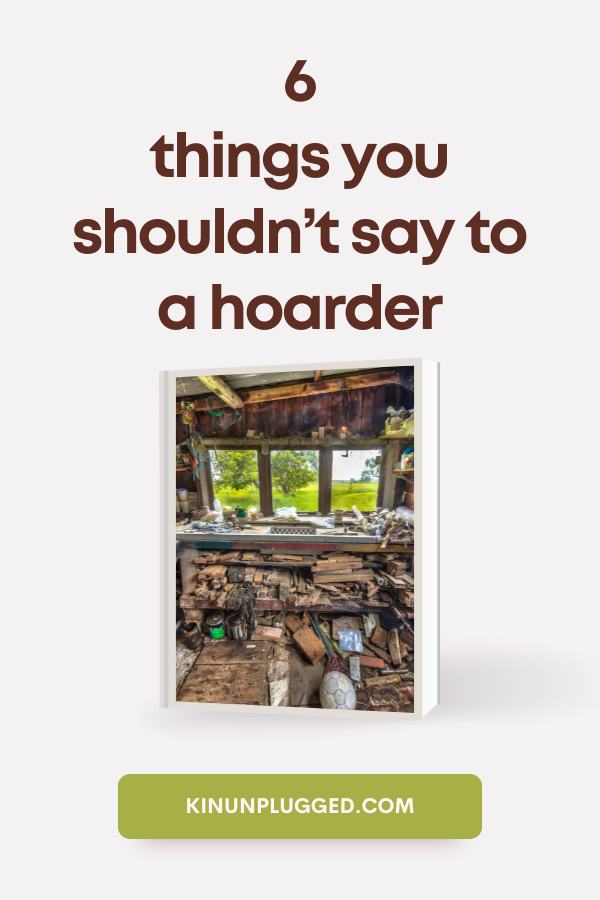
When you’re speaking with a hoarder, it’s important to avoid language that can be judgmental or dismissive. Here are some things you shouldn’t say:
- “Why can’t you just throw this away?”
- “This place is a mess. How can you live like this?”
- “You need to get rid of all this junk.”
- “You’re just lazy and unorganized.”
- “This is disgusting.”
- “What’s wrong with you?”
Comments like those above can make hoarders feel ashamed, defensive and misunderstood, hindering any progress towards change. Instead, approach the situation with empathy and understanding. For example, children of hoarders often experience significant emotional and psychological impacts from their parents’ behaviors.
Being compassionate and supportive can create a more conducive environment for addressing the issue.
18 Things you must do if your Parent is a hoarder
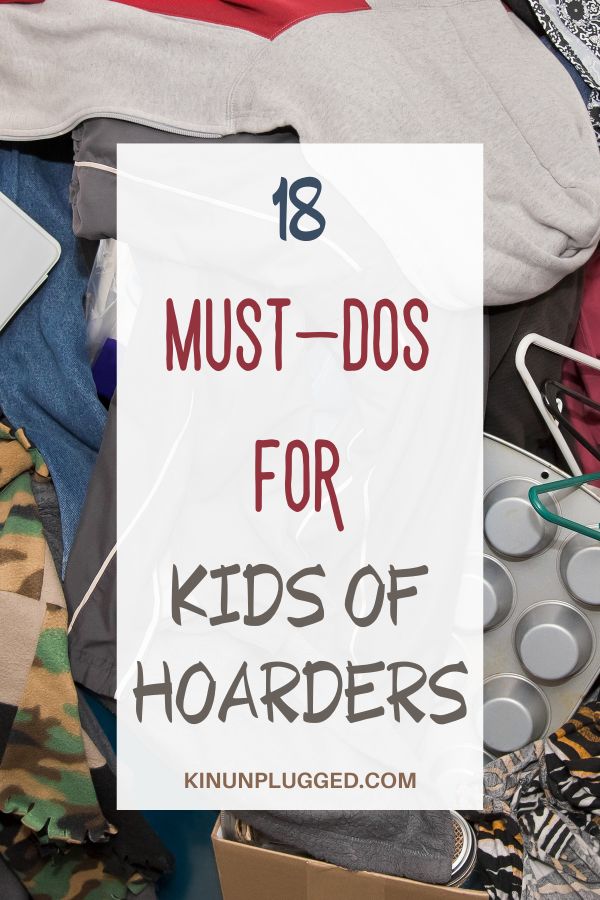
If your parent is a hoarder, it can be challenging and emotionally draining.
- Educate yourself. Learn about hoarding disorder to understand its complexities. This can help you approach the situation with empathy and knowledge.
- Communicate with compassion. Talk to your parent about your concerns without judgment. Use “I” statements to express how their hoarding affects you and the household.
- Seek professional help. Encourage your parent to see a mental health professional who specializes in hoarding disorder. Therapy, particularly cognitive-behavioral therapy (CBT), can be effective.
- Set boundaries. It’s important to establish clear boundaries for your own well-being. If you live with them, create personal spaces that are clutter-free.
- Safety first. Ensure the living environment is safe. This may include clearing pathways and exits and addressing any immediate hazards.
- Support networks. Join support groups for children of hoarders to connect with others who understand your situation and can offer advice and support.
- Be patient. Recovery from hoarding is a slow process. Celebrate small victories and be patient with your parent and yourself.
- Involve other family members. If possible, involve other family members in discussions and planning. A united approach can sometimes be more effective.
- Offer practical help. Assist your parent with small, manageable tasks. For instance, you can help sort through a small area or category of items, like newspapers or clothing.
- Create a decluttering plan. Develop a step-by-step plan with your parent for decluttering. Break the process down into small, achievable goals to prevent feeling overwhelmed.
- Respect their decisions. It’s important to respect your parent’s autonomy. Forcing them to get rid of items can lead to conflict and resistance.
- Legal and financial considerations. If the hoarding situation poses serious health or safety risks, or if your parent is unable to make decisions, you might need to consider legal options. This could include seeking advice on guardianship or power of attorney.
- Use positive reinforcement. Praise your parent for any efforts they make towards reducing clutter. Positive reinforcement can motivate them to continue making progress.
- Address underlying issues. Understand that hoarding is often linked to emotional issues such as anxiety, depression or trauma. Addressing these underlying issues can be crucial in managing the hoarding behavior.
- Focus on quality of life. Emphasize how decluttering can improve their quality of life, including health benefits, increased living space and reduced stress.
- Professional cleaners. In severe cases, hiring professional cleaners who specialize in hoarding situations can be beneficial. They have the expertise to handle the clutter safely and respectfully.
- Prepare for setbacks. Understand that setbacks are normal. Hoarding disorder is a chronic condition and relapses can happen. Stay supportive and encourage ongoing treatment.
- Maintain your own well-being. Dealing with a hoarding parent can be stressful. Make sure to take care of your own mental and physical health. Consider seeing a therapist yourself to process your emotions and experiences.
What is the trauma of children of hoarders?
The trauma of children of hoarders can be profound and long-lasting, impacting their emotional and psychological well-being. Adult children of hoarders often carry feelings of shame, embarrassment and anxiety due to their chaotic and cluttered living environments. These feelings can stem from a lack of normalcy in their childhood home, which might have led to social isolation and difficulties in forming healthy relationships.
Also, they may struggle with perfectionism or compulsive behaviors as a response to their upbringing. Learning how to deal with hoarder parents is essential for these individuals, as it involves setting boundaries, seeking professional help and finding ways to address the emotional baggage carried from their past. This process is vital for their healing and for establishing healthier dynamics with their parents.
RELATED: 9 Clear Childhood trauma symptoms in adults
Are you a child of a hoarder? How are you dealing with or have you dealt with the experience of being parented by a hoarder?

